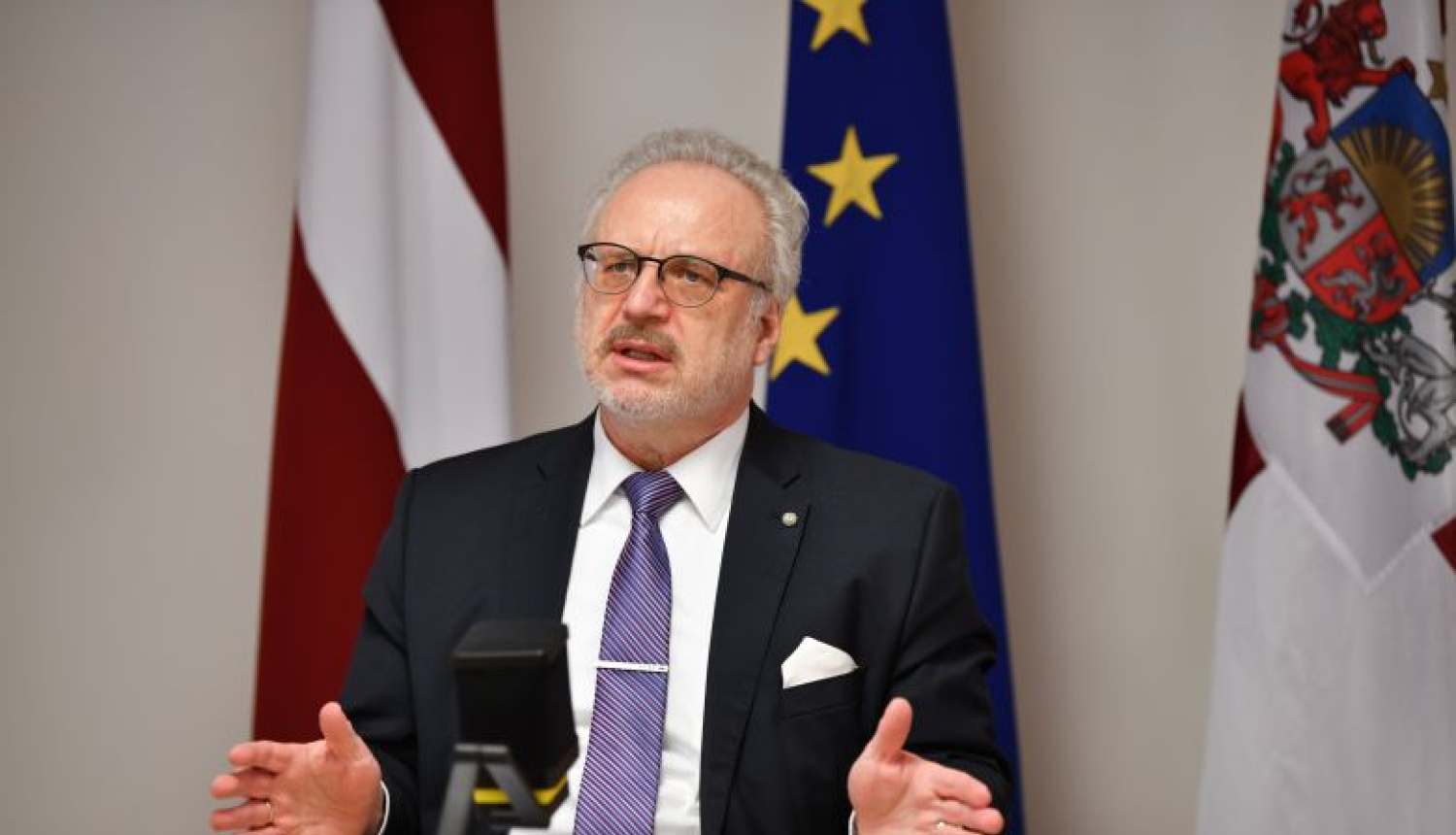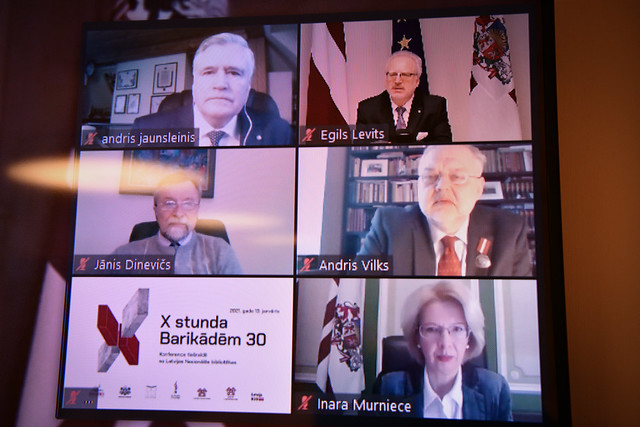Good morning dear coordinators and participants of Barricades,
Good morning everyone who has joined our conference remotely,
Defining historical moments, which signify certain time periods, are forever entrenched and embedded in the national identity. Actions taken during these periods become a benchmark to be replicated, a role model for future actions, and every time, although history always takes a different route, serve as a beacon illuminating the path for others.
Those barricades erected in January of 1991 sent a clear and concise message to future Latvia: ‘You have to be ready to defend Latvia to live in your own country’. Defend it in any way and with any means available and possible at the time.
Threats may change, yet the common theme underlying what is happening today and what happened 30 years ago is that citizens are responsible for what happens to the state. State is rooted in its people’s will. If state exists, we have to be ready to defend it. The stronger the will of the people to have own state, the stronger this state will be.
In 1991, the only way to defend the newly independent Latvia was through non-violent resistance and potential civil disobedience at the national level if USSR decided to invoke direct presidential rule.
Without a formal declaration of war, USSR moved its army and mercenaries into Baltics launching a military aggression, which was met by organised and coordinated civil actions. USSR military and conservative party leadership was also supported by local collaborators. As we all know, slightly later, in a poll carried out on 3 March 1991, 400,000 residents of Latvia voted for its independence. Many of them were Soviet citizen who had resettled to Latvia during the Soviet occupation.
Non-recognition of the occupation of Baltic countries, of course, gave Latvia, Lithuania and Estonia a special status. Intense efforts of Baltic politicians outside Baltics helped keep the Baltic independence claims on the international agenda. Well-organised, efficient and dedicated Latvian diaspora in the United States of America, Canada, the UK, Germany, Sweden, Australia and other countries also played a crucial role. As barricades were erected, Western leaders gave a warning to the Soviet Union: use of force may lead to economic sanctions on the Soviet Union. Unfortunately, such reaction to Soviet aggression was too weak and quickly failed, as we can see from events that took the lives of civilians in Riga and Vilnius.
Pro-democracy and self-determination movements in the Baltics in late 1980s and independence restoration declarations of 1990 had created a dent and weakened the Soviet empire. In addition, the failing Soviet economy and establishment were no longer capable of preventing the Baltic countries from breaking away. Still, people had to figure out when and how to do that. As you all know, not all former parts of the Soviet empire knew how to do that.
Breaking point came in January of 1991 when people decided to erect barricades to protect Latvia, thus showing the whole world their resolve and courage in pursuing the desired objective. It became obvious that recognition of Latvia’s and its Baltic counterparts’ independence is now only a matter of time.
We should not let cowards telling myths about how we broke away from the Soviet Union only by singing overshadow the dire truth of the events that took place in 1991. For instance, some claim that independence just fell into our lap, that it somehow just happened by itself or that everyone living in Latvia at the time wholeheartedly supported the independence.
We had to fight for freedom declared in 1918 in a War of Independence, while renewed independence declared on 4 May 1990 had to be defended on barricades. Our people were brave enough and their national aspirations were strong enough to achieve that.
Dear friends,
Barricades symbolise our people’s will to defend our state. So, as we remember those days, I think it is worthwhile revisiting some aspects of those actions that are important to our national security to this day.
According to the preamble of our constitution, Satversme, people of Latvia have the duty to keep their national aspirations strong to be able to defend Latvia’s freedom and democratic system against any internal or external threats whenever the need may arise.
To better protect itself against external threats, Latvia must be fully committed to and engaged in the collective defence. In terms of defence spending and development of capabilities, as well as participation in international missions and peace-keeping operations.
World has changed significantly in past decades and NATO must also restructure to be able to provide the security of its member countries in these new and evolving geopolitical conditions. Latvia must take active role in defining and implementation of the new NATO2030 strategy. The new vision should give a clear assessment of regional security threats faced by the Baltics.
NATO2030 must be a defence strategy that addresses conventional threats and also deals with cyber threats, climate change and possible need to fight with future pandemics. By solving these problems at local level, at home, we are contributing to our quality of life and security as much as the overall safety and benefit of the Alliance.
We need stronger NATO and stronger European pillar of the Alliance in particular. Latvia is firmly committed to NATO. NATO can count on us and we can count on the Alliance.
Fellow Latvians,
Those of you who stood on barricades will remember the sense of resolve that invigorated all of you.
However, as we can see there are currently several intentional and unintentional patterns undermining the national aspirations in today’s society. I would compare them to wood worms that eat away at our people’s ability to think rationally and come together for common cause.
I am talking about disinformation targeting the evident facts, doubting what Latvia has achieved in recent 30 years. We must counter this disinformation with hard facts. However, that will not be enough. Disinformation, false information and conspiracy theories are not likely to disappear as long as there is broad demand for them.
We can squeeze them out of the public perception only by strengthening the collective, inherent resilience against the irrational, magical thinking and superstition.
We must counter it with critical thinking, rational arguments, honest discussion, and, more generally, with balanced and meaningful views on what the world is like, and the common values inscribed in the Preamble of Satversme. It requires a meaningful long-term civic education strategy rolled out by the public sector together with non-governmental actors and citizen or individuals.
As I have underlined on a number of occasions, being a citizen in a democracy means that you have certain responsibilities. It is a constant effort. As a citizen, you have the right to live in your own free country and benefit individually from collective resources. But you also have to engage in caring for your country. You have the duty to be a part of the efforts to multiply the common good.
That is why we as a society and individuals are interested in having as many people with necessary civic education around us as possible to strengthen the core values and national identity underpinning our democratic and political system as a nation state.
The National Defence Education and Youth Guard Law recently adopted by the parliament is a welcome step in the right direction. Upper secondary education curriculum will provide national defence education, skills required to survive and respond to a crisis at an individual level and other useful competencies like media literacy and critical thinking.
That is an adequate and very modern way to address these issues and reinvigorate loyalty, national identity, understanding that security is not something created by somebody for the convenience of others. Threats may change, but responsibility to keep the state going and safe will always belong to its citizens in one way or another.
Sustainability of the Latvian State depends on national aspirations of its people, shared understanding of what constitutional values imply and readiness to defend both.
I want to thank everyone who stood on barricades 30 years ago defending our state. Thank you to everyone who supported those on the barricades with whatever they could offer, ensuring that barricades withstand all the pressure. Thank you for giving us an opportunity to live in free, democratic and Latvian state 30 years from the Barricades.
What you did is a true benchmark and inspiration to this day.
Thank you!





